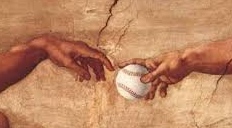
Getting Home
I recently attended a Mass at Old St. Patrick’s Church in Chicago’s West Loop where the new archbishop, Blase Cupich, happened to be visiting and conducting the liturgy.
As usual in that parish, the liturgy was beautiful and moving. You could feel the energy and joy of the people of that church, which was packed to the seams with people of all ages and colors.
Cupich told the story about a talk he had with a business exec in his 40s who told him that he hadn’t visited his parents in five years. He couldn’t bring himself to visit them because of their continual criticism and censure. He had left home as soon as he could and didn’t know if he would ever return.
In a continuing conversation with the man, Cupich used baseball as a parable for life. After a batter gets a hit, he runs from home as fast as he can and arrives at first base, proud of himself for a degree of success. Due mostly to the efforts of another hitter, he then gets to second base, where he realizes that there’s only one more base between him and home. Will he be able to get there and then home? Or will he be called out somewhere between here and there?
Longing for Home
No metaphor is perfect or complete, but this one can easily be applied to the longing for home that’s implicit in the search for God.
Tomas Halik, the Czech philosopher and psychologist I quote often in these blogs, has some interesting observations about what is perhaps the most famous of gospel parables about coming home: the Parable of the Prodigal Father.
According to the gospel of Luke, as related in the Message Catholic/Ecumenical version, a young man asks for his inheritance from his father, who had one older son as well.
“So the father divided the property between them. It wasn’t long before the younger son packed his bags and left for a distant country. There, undisciplined and dissipated, he wasted everything he had. After he had gone through all his money, there was a bad famine all through that country and he began to hurt.”
He got a job with a pig farmer (the worst job possible, given the ancient Hebrews’ aversion to pigs?), the story goes, and was so hungry he longed to eat the corncobs in the pig slop. That brought him to his senses, and he decided to return home where his father’s farmhands had plenty to eat. He decided to ask his father to take him on as an employee.
“When he was still a long way off, his father saw him. His heart pounding, he ran out, embraced him and kissed him.” He called the servants and arranged for a homecoming party. As you may recall, the older brother, who had stayed at home and worked for his father, was outraged and resentful.
The father consoled him, too, however, telling him that “everything he has is his” but that the family had to celebrate because “this brother of yours was dead, and he’s alive! He was lost, and he’s found!”
“Prodigal,” according to the dictionary, is “characterized by profuse or wasteful expenditures” and Halik writes that this could be called the “Parable of the Prodigal Father.” Unlike many parents, this father was absolutely lavish in welcoming a son who had betrayed him and blown half of his wealth.
The younger son has no noble reasons for returning home, Halik writes. He was hungry and nostalgic for his former good life. And the father wasn’t interested in judging his son or determining who was right in the family breakup. All he wanted to do was hug his son and show his love.
Attracted by the Big, Wide World
Some of us are the younger brother. We long for freedom from tradition, restraints, even from our families, and are attracted by the big, wide world and all it has to offer. We want it all, but we usually find that “success” isn’t always what it’s cracked up to be, and no matter how much we have, we can feel empty and wonder what we’ve missed.
Some of us are the older brother. We prefer order to freedom. We follow the rules, conform and do what we’re supposed to do, and we resent people who don’t follow the same path. We look for ways of pointing out their flaws. We become especially angry if we see those freedom seekers finding happiness.
Most of us are a mixture of the older and younger brothers. Returning to the baseball analogy, we may be at first, second or third base or still trying to get a hit, and we may be ambivalent about getting home. But from all we know from the Hebrew and Christian bibles, God is the model of the prodigal parent. He/she is waiting to be extravagant with us, to lavish us with his/her love.
Bogged down in our own pursuits, we may be unable to see or feel this, however. Like baseball players, we need openness, persistence and a willingness to accept uncertainty – remembering that we often have to rely on others to get the hit that will send us to the next base, and home.


